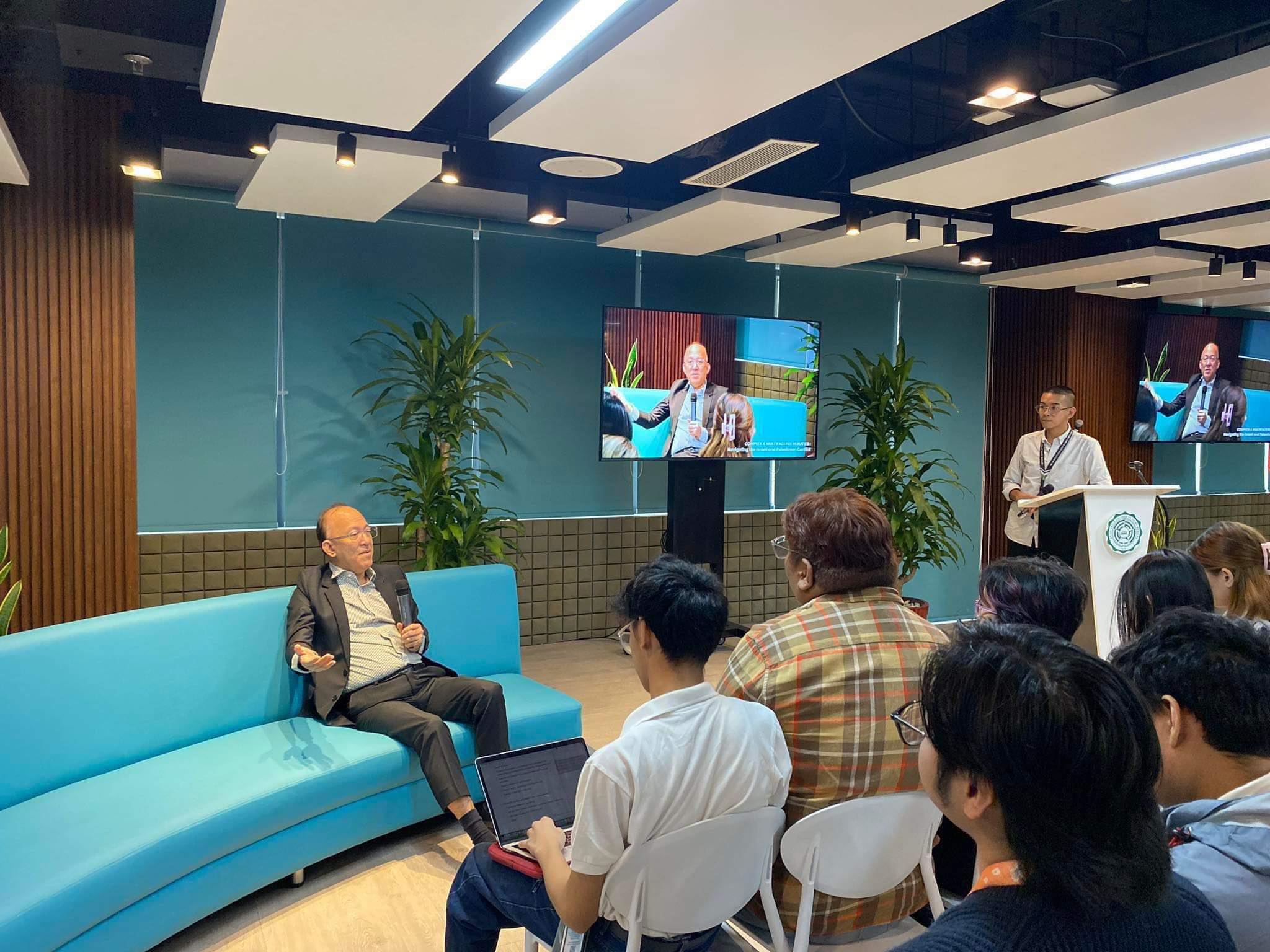With the theme, “Complex and Multifaceted Realities: Navigating the Israeli and Palestinian Conflict,” SDG held a dialogue to inform the Benildean community about the progressing violence, destruction, and human rights violations of the Israel-Palestine conflict on Jan. 25 at The Atrium @ Benilde Campus.
To kickstart the event, Mr. Raph Cortez, SDG professor and event moderator, extended a warm welcome to the attendees. In his opening remarks, he mentioned the event's importance as it focuses on one of the most pressing issues confronting the international community today: the ongoing conflict between Israel and Palestine.
Mr. Cortez then welcomed SDG Dean Gary Ador Dionisio, DPA, who gave an introduction to the topic. “At least 25,700 people have been killed, while 63,740 have been wounded in Israel’s attack since Oct. 7. The death toll in Israel due to Hamas’ attacks stands at 1,039, and the majority of those who have been killed are children and women,” Dean Ador Dionisio emphasized.
SDG issued an official statement last year, condemning both the Israeli government and Hamas for killing innocent civilians and urged for an immediate ceasefire.
Dean Ador Dionisio reiterated, "The International Association of La Salle Universities, which DLS-CSB is a member, calls for an immediate humanitarian ceasefire in Gaza, West Bank, that is currently shaking the stability in the Middle East.”
“The duty of the academic institution to critically understand the historical and geopolitical crisis in the region, alongside our La Sallian values and our Benildean expression,” he added.
Regarding the importance of this dialogue, he expressed, “This dialogue is an opportunity for all of us to deepen our understanding [of] the current crisis, and a hope for our active international solidarity with the Palestinian population and civilians of Israel.”
The invited guest speaker, Sec. Ronald Llamas, was a Former Presidential Adviser for Political Affairs, Human Rights Advocate, and International Development Consultant. Sec. Llamas initiated the dialogue by recounting his firsthand encounters with former Israeli and Palestinian leaders advocating for a two-state solution and peaceful coexistence, both of whom were assassinated.
He highlighted how this event offered only a glimpse into the complexities of the situation. He stated, “What we see is not necessarily what is real…‘Yun yung nangyayari sa Israel."
When did it all start?
Oct. 7 most definitely wasn’t the start of this conflict. “Nagsimula siya nung 1917, dahil a large chunk of the Middle East was colonized by England. Malaking [reason] din diyan ay ‘yung Turkey at ‘yung England, kung sino ba talaga ang may hawak ng Middle East. Pero even before the end of World War I, nagkaroon ng Balfour Declaration, this started the partition of Palestine into two states.”
“Diyan nagsimula ang major migration ng mga Jews all over the world. Ang namuno d’yan ang mga Zionist na naghahanap ng homeland para sa Israel.”
After World War II and the Holocaust, many survivors migrated to Israel, with the majority being scientists and engineers. Their entry contributed to Israel’s capacity to fast-track the creation of its government and their state.
However, this development instilled fear among Palestinians as they found themselves marginalized, having not yet established their own state. However, Sec. Llamas emphasized the point that Palestinians were already living on their land even before it was established as a state.
“...Sa partition, na ang dati talaga [tina]tawag ay Palestine, kahit wala [pang] gobyerno or estado ‘yung mga Palestinians. [Pero] may de facto state ‘yung mga Palestinians,” he clarified.
Sec. Llamas also shared additional necessary points to help understand the conflict. Firstly, he shared that Israelis’ claims to the Palestinian land are tied to a more than 2,000-year history dating back to Moses’ exile. While the second point emphasized that religion was not the driver of this conflict–but rather politics.
Towards the end of the event, Mr. Cortez led a guided panel discussion. He implored on the possible course of action the Philippines could take to deter the humanitarian challenge that takes into account the presence of Overseas Filipino Workers (OFWs) in Israel.
Sec. Llamas responded, “[Our] first [priority] is to protect the welfare of our people in Israel, but we can't turn a blind eye [to] the genocide.”
Moreover, he asserted, “We have to call a spade a spade. There are no ifs and buts when it comes to genocide—you are either for or against it.”
“Sometimes it's hard for us to read between the lines, but we should know how,” he concluded.
Center for Social Action (CSA) Director Ms. May Flor Artagame was called on stage to share her closing remarks. “Habang tinitignan natin ‘yung mga Palestinians, that should also remind us of our experience.”
In closing, she urged all attendees to “Pray for the people in Gaza, and of course, call for a ceasefire.”
The dialogue series was done in partnership with CSA and in observance of the Lasallian Mission Week.


